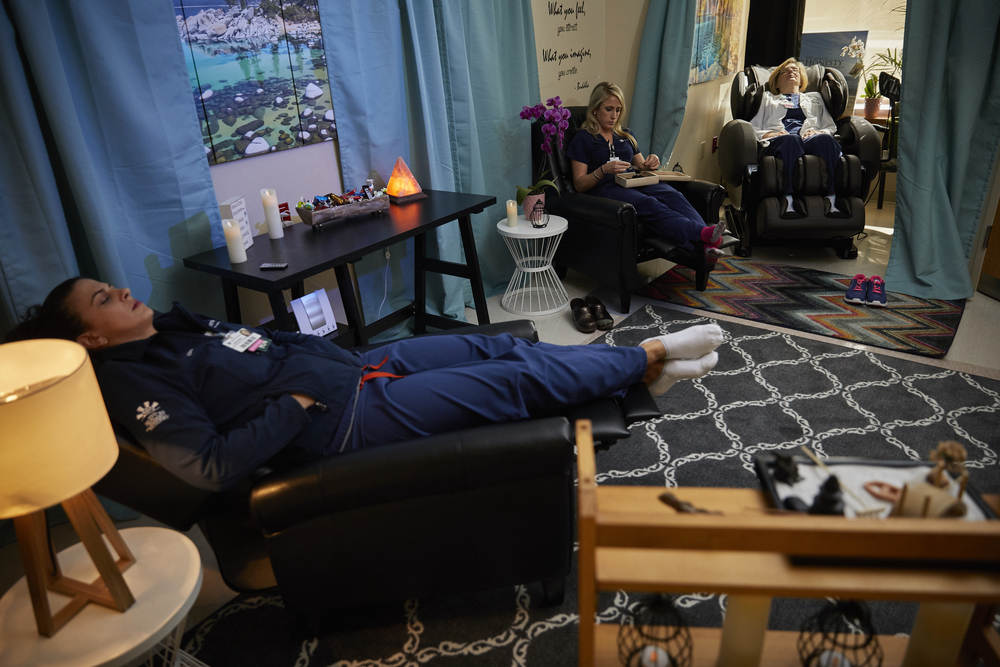The last 18 months has been exceedingly challenging for the healthcare industry, with several waves of COVID-19 on top of a growing nationwide trend of harassment of healthcare workers. The burnout can be so severe that some healthcare workers are quitting their jobs for their own mental health.
ChristianaCare didn’t wait for a pandemic to put programs in place to support its employees, which the Newark-headquartered health system refers to as “caregivers,” said Dr. Heather Farley, chief wellness officer and head of ChristianaCare’s Center for WorkLife Wellbeing.
“We’ve long known that working in healthcare, as well as being rewarding, is also uniquely challenging, whether you’re patient facing or not,” Farley told Technical.ly. “We’re really determined to meet the needs of our caregivers and create an environment that enables them to flourish and do what they do best.”
That means many of the types of personal wellness perks offered my many companies, including physical fitness, meditation and nutrition. ChristianaCare’s approach is fundamentally different from one that focuses on wellness perks for individuals, according to Farley. Their key focus is on creating a whole culture of wellness.

Dr. Heather Farley. (Courtesy photo)
“I often use the canary in the coal mine example,” she said. “You can’t just take the canary and teach it to be more resilient and then take it back to the same coal mine and expect it to survive. You actually have to change that coal mine.”
This month, ChristianaCare was awarded a Gold Recognition by the American Medical Association’s Joy in Medicine Health System Recognition Program. Only four other health systems nationwide received Gold, the highest recognition possible.
Some of the things that contribute to a culture of wellbeing include psychological safety; diversity, equity and inclusion; camaraderie; and a “culture of continuous improvement” where caregivers can feel empowered to identify and solve problems, Farley said.
“One tangible example of culture change that has occurred over the years that we’ve been doing this work is the effort on decreasing the barriers to help-seeking behaviors,” the exec said. “We’ve created a culture where our caregivers know it’s OK to not be OK. So with the 24/7 mental health support [we offer], a peer support program of 75 trained peer supporters and 260 trained in psychological first aid, we’re prepared to be truly there for our caregivers when they ned help.”
Sometimes, caregivers need to stop and give themselves a “reset.” One of the offerings for ChristianaCare employees are what they call OASIS rooms, quiet sanctuaries inside the hospital where caregivers can go to de-stress. Not to be confused with mere break rooms, these spaces are aesthetically pleasing and relaxing environments with warm lighting and massage chairs where caregivers can decompress before, after or during their shift.
Another is a thank-you project where the hospital brings families and patients back to meet the caregivers who took care of them when they were ill.
“The opportunity to see the impact of their work really refills their tank and it helps them remember why they went into healthcare in the first place,” Farley said.
The healthcare industry may be uniquely susceptible to burnout, especially as the pandemic hangs on, but ultimately, the culture-focused model for well-being can be applied across all kinds of workplaces.
“We don’t just want to decrease burnout,” Farley said. “We want to create an environment where our caregivers can flourish.”

This editorial article is a part of Tech + Health Month of Technical.ly's editorial calendar. This month’s theme is underwritten by the Chesapeake Digital Health Exchange. This story was independently reported and not reviewed by CDHX before publication.
Join our growing Slack community
Join 5,000 tech professionals and entrepreneurs in our community Slack today!
Donate to the Journalism Fund
Your support powers our independent journalism. Unlike most business-media outlets, we don’t have a paywall. Instead, we count on your personal and organizational contributions.





